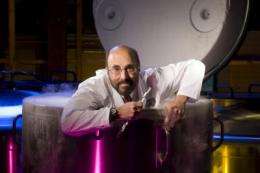Lab that probes genetic clues to disease is poised for major expansion

Despite the continuing, crippling effects of a nationwide recession, a genetics research laboratory on Rutgers' Busch Campus is experiencing an economic boom.
And the continued success of the Rutgers University Cell and DNA Repository (RUCDR) is not only raising the university's profile as a world leader in human disease and genome studies, but is also bringing in millions of dollars in federal and foundation grants that benefit the economy throughout the region.
The center, which opened in 1998, is experiencing unprecedented demand for its specialized ability to extract, process, and analyze DNA and other biological samples for the genetic clues to autism, schizophrenia, alcoholism and many more diseases and conditions that confound researchers and affect countless lives.
"The amount of work we do has been doubling every two to three years," said Jay Tischfield, MacMillan Professor and chair of the Department of Genetics. "It's at least 20 times as much as when we started 12 years ago."
Yet the mostly federally-funded work that the center performs has outstripped the capacity of its Allison Road facility. So, the government is footing the bill for an expansion that will turn the repository into a robotics-driven laboratory that will more fully automate the process by which faculty examine the human genome at an ever deeper and finer level.
In order to do this work with so many thousands of samples, you really need robotics, and robotics requires a very special space," Tischfield said. "It needs space where one robot can feed into another. So this new construction will be very open and won't be of the traditional design. All the benches will be movable, so that we can reconfigure it in any way we need, as the demands of our research require."
The project, which is in the final planning stages, will be paid for with a $9.6 million grant that the center received from the National Institutes of Health's National Center for Research Resources under the American Recovery and Reinvestment Act. The centerpiece of the Obama administration's economic stimulus plan, the act appropriated $1 billion to construct, repair, or renovate non-federal research facilities.
Rather than erect a new building, the project calls for renovating the 2nd floor of the C Wing in the Nelson Biology Laboratories. Part of the wing will house the laboratory and part will serve as offices for faculty who specialize in computational and statistical genetics. The area is one floor above the existing RUCDR lab.
"The new facility will continue our work on all of the diseases that we study, everything from autism to bowel disorders," Tischfield said. "There has also been a lot of money allocated in the last couple of years . . . to [study] bipolar disorder, and major depression."
The project is expected to provide a boost to the economy - a boost that begins on campus and radiates out to the local, regional, and state level.
Once it's up and running, the facility will house at least 50 employees of RUCDR, roughly 30 of which will be new hires, Tischfield said. Meanwhile, other new positions may be created in the areas of maintenance, security, landscaping, grant management and facilities.
In addition, the project will provide between 50 and 100 constructions jobs for about a year.
And, afterward, there will be an ongoing need for lab equipment and supplies.
"Some of these will be purchased through New Jersey middlemen, or actually produced in New Jersey," Tischfield said.
The project is a plus for students in the Department of Genetics, many of whom do research in the center or in other genetics laboratories and some who end up working there after graduation.
"Many of the employees in the RUCDR are Rutgers graduates," Tischfield said. "Every year I would say that more than half of the employees we hire are Rutgers graduates. These are kids who saw the RUCDR when they were undergraduates, thought it would be a good place to spend a few years when they graduate and learn some skills, or stay forever."
In the end, however, some of the biggest benefits of the expansion will be felt over the course of many years - from medical breakthroughs that help those suffering from illness and disease.
"These diseases, we speculate, are not caused by the same things in each affected person," Tischfield said. "So one of the things we've done here is we put together one of the world's largest collections of subjects with various diseases. Now we can interrogate very deeply the DNA of thousands if not tens of thousands of people. And this allows us to get a real handle on the causes of these common diseases."
















